{UAH} Reclaiming Remembrance: 'I thought it was a white event'
Reclaiming Remembrance: 'I thought it was a white event'
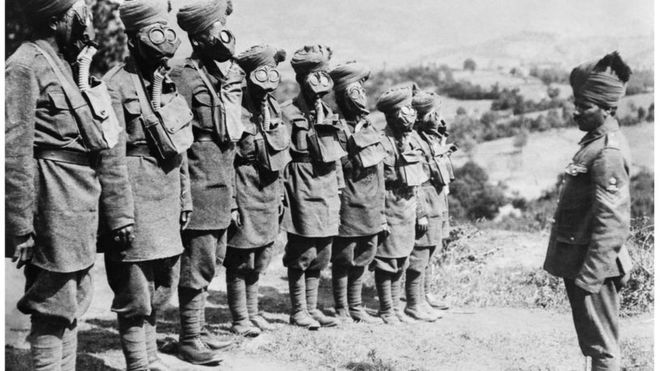 IWMA group of Indian soldiers doing gas mask training in World War One
IWMA group of Indian soldiers doing gas mask training in World War OneRemembrance serves as a way to honour those who gave their lives for Britain in conflict, including during the two World Wars, but do all those who fought get the recognition they deserve?
It was a conversation with a patient researching the Commonwealth contribution to World War One that sparked Dr Irfan Malik's interest in finding out about his ancestors.
"Before I knew how much the Indians had contributed, growing up I thought it was very much a white war," he said.
"We weren't taught about the Indians in school."
It's a sentiment researchers at think tank British Future regularly come across in their efforts to highlight Muslims' participation in World War One and Two.
Some 1.3 million Indian soldiers who fought in the WW1, of whom 400,000 were Muslim. In World War Two, about 2.5 million Indian soldiers took part, including 600,000 Muslims.
- Why the Indian soldiers of WW1 were forgotten
- Does Dunkirk ignore the role of the Indian army?
- White, red or not at all: Your poppy guide
"There is a large appetite for this story to be told," said Sunder Khatwala, director of British Future.
"Remembrance is such an important occasion for the whole country that it is important we can all take part in it.
"It is part of the tapestry of the country's history."
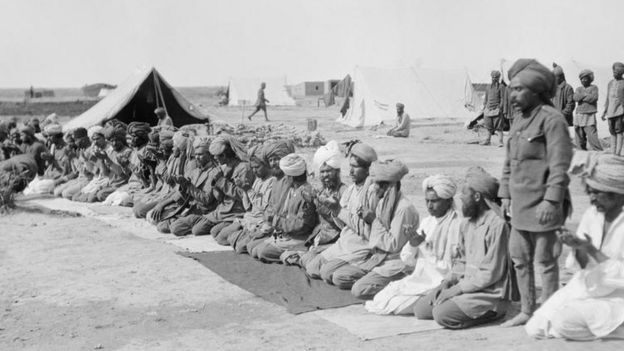 IWMMuslim soldiers offering prayers during World War One
IWMMuslim soldiers offering prayers during World War OneGrowing up in Nottingham, Dr Malik was well aware of Britain's annual Remembrance Day celebrations.
But as a Muslim, he says he did not feel a personal connection to the events.
However, his chance conversation led to three years researching his ancestry, and the discovery that both of his great-grandfathers were Indian Muslim soldiers who fought in WW1 alongside the British army.
Dulmial village in Punjab - then part of British India - sent 460 of its men to fight in WW1, the largest number from any village in South Asia.
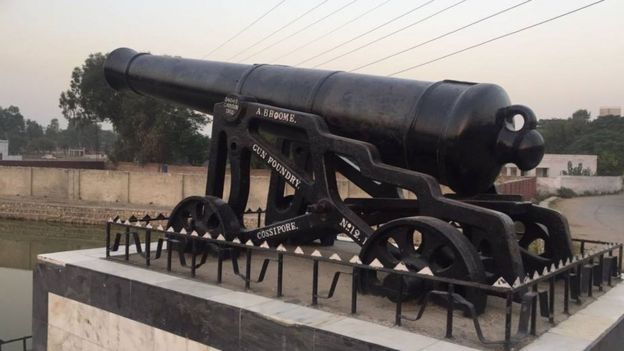 DR IRFAN MALIKThe Dulmial cannon was awarded to the village in 1925, for sending the most soldiers (460) to war out any South Asian village.
DR IRFAN MALIKThe Dulmial cannon was awarded to the village in 1925, for sending the most soldiers (460) to war out any South Asian village.They included both of Dr Malik's great-grandfathers, Subedar Mohammed Khan and Capt Ghulam Mohammad. It was a contribution, he says, that finally made him feel he had a connection to Remembrance.
"I used to see the Remembrance functions happening and I didn't feel I could take part in them fully," he said.
"But now I actually take part in fundraising for the Poppy Appeal and lay a wreath each year for Remembrance Day to remember my ancestors."
But, says Dr Malik, not enough has been done to highlight the contributions of Muslims to the British war efforts - so he decided to take matters into his own hands.
"When I realised there was very little information on this, I decided to become a teacher myself; now I go into schools and other organisations.
"I think it reduces hate between communities and helps community cohesion. If soldiers of different faiths could fight side by side 100 years ago, why can't we get on as community groups now?"
The Punjab village that supplied the British army
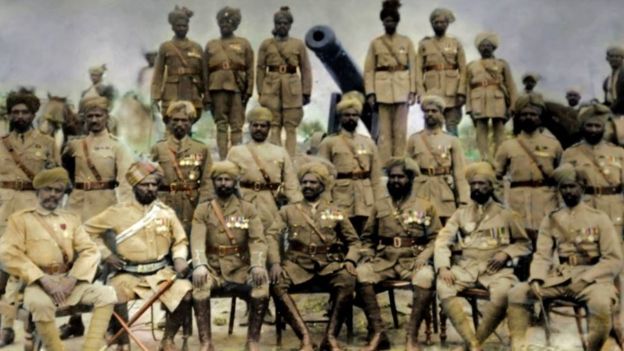 DR IRFAN MALIKSitting front centre is Capt Ghulam Mohammad., second row, second from right is Subedar Mohammad Khan
DR IRFAN MALIKSitting front centre is Capt Ghulam Mohammad., second row, second from right is Subedar Mohammad KhanDulmial had a long history of producing soldiers.
During WW1, when it was part of British India, the village, approximately 100 miles south of Islamabad in the Salt Range region, sent 460 men to fight in the British army. Nine from the village lost their lives.
Among those who fought were Dr Malik's great-grandfathers, Subedar Mohammed Khan, an Indian officer in an infantry regiment of the British Indian Army, and Captain Ghulam Mohammad.
When war broke out in 1914, Subedar Khan and Capt Mohammad were already soldiers able and willing to join the conflict, both having signed up in the 1880s.
While little is known about Capt Ghulam Mohammad, Subedar Khan served in the 33rd Punjab Regiment.
He received medals for fighting in the Tochi campaign in the north-west frontier of what is now Pakistan.
Subedar Khan retired in 1918 after about 40 years of service, returning to farm in Dulmial.
Dr Malik's comments are echoed by Rabia Mirza, from Derby, who recently learnt her great-grandfather Mirza Firoz Din served with the Bombay Engineer Group, building trenches and bases for the British army.
"I was never interested in history at school. All I saw were white faces I couldn't relate to," she said.
"Now I know about my great-grandfather, I feel much more in touch with Remembrance.
"I think the media could certainly do more to educate people about the contributions of the Indian soldiers."
Ms Mirza cited Christopher Nolan's 2017 film Dunkirk as an example of a missed opportunity to highlight the contribution of minorities to war efforts.
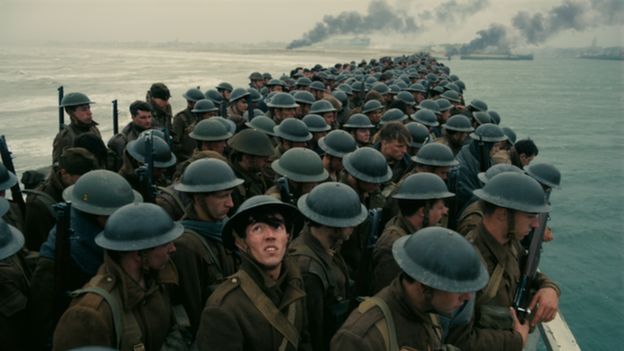 WARNER BROSDunkirk tells of British and Allied troops trapped on a beach surrounded by enemy forces in 1940
WARNER BROSDunkirk tells of British and Allied troops trapped on a beach surrounded by enemy forces in 1940Answering his critics, Nolan argued he approached the film as a "pure survival story" rather than focusing on the politics of the battle, and the film's historical consultant Joshua Levine told the BBC it was a work of fiction, adding "it isn't a film's job to tell the full story of Dunkirk... and nor, in the time available, could it even try to do so".
But Ms Mirza said: "I think this kind of thing hinders the diversifying of Remembrance and if media like this were to be more representative it would help."
While the lines might be blurred regarding historical representation in film-making, the Royal British Legion says diversity is now an "integral part" of its Remembrance work.
It says it has worked with community organisations, such as the Punjab Heritage Association, to co-create content and encourage further communities to seek out their stories.
It also plans to run a campaign celebrating diversity and dual heritage that challenges and changes perceptions of World War One, during the centenary of the 1918 Armistice.
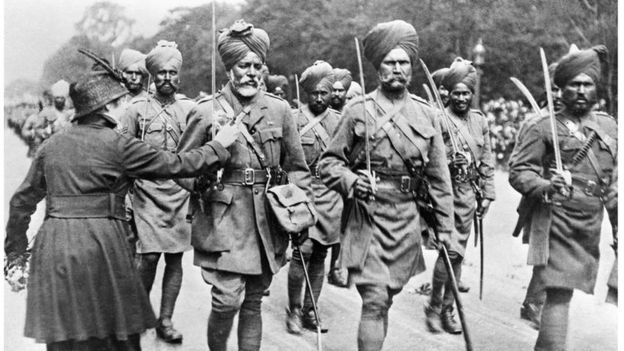 IWMGiving flowers to soldiers was a traditional sign of welcome and support
IWMGiving flowers to soldiers was a traditional sign of welcome and supportRecently, Birmingham's and Leicester's Central Mosques, along with Nottingham's Karimia Mosque, signed an Armed Forces Covenant to strengthen links with the military.
Muslim communities are also beginning to hold their own Remembrance events for the first time.
Sultan Bahu Mosque in Birmingham held a two-hour ceremony last weekend to honour fallen Muslims.
Organiser Hafiz Shauket Fazil said it was important to show the young pupils of the mosque that "they have a stake in the country".
In attendance was Jahan Mahmood, from Birmingham, who was inspired to become a military historian by his uncle Mohammed Zabir, who served in the British 14th Army in Burma in World War Two.
The Indian Army and the world wars
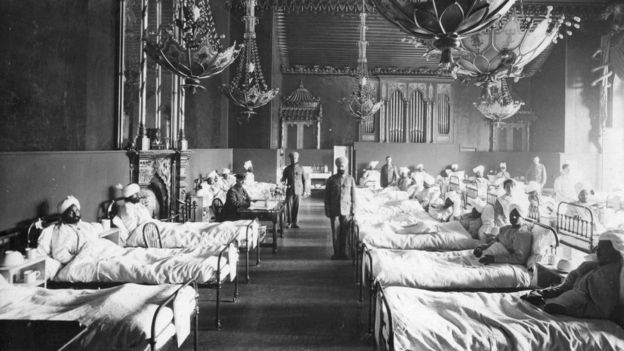 GETTY IMAGESInjured Indian soldiers at Brighton Pavilion in 1915
GETTY IMAGESInjured Indian soldiers at Brighton Pavilion in 1915- Approximately 1.3 million Indian soldiers - Hindus, Sikhs, Muslims and Christians - served in WW1, and 2.5 million in WW2
- As many as 74,187 Indian soldiers died during WW1 and a comparable number were wounded
- India contributed a number of divisions and brigades to the European, Mediterranean, Mesopotamian, North African and East African theatres of war
- Nearly 700,000 Indian sepoys (infantry privates) fought in Mesopotamia against the Ottoman Empire, Germany's ally, many of them Indian Muslims
- Participants from the Indian subcontinent won 13,000 medals, including 12 Victoria Crosses in WW1
- Thirty Indians won Victoria Crosses for their bravery during WW2
Zabir was kidnapped by army recruiters from his school playground at the age of 16 and forced to serve in the war, his family having no knowledge of where he had gone.
He served in Burma from about 1942 in the medical corps, but also saw action fighting against the Japanese.
He was captured by the Japanese and spent the rest of the war as a prisoner, suffering severe malnutrition and being beaten badly, while watching his comrades go through similar ordeals.
When he returned home he suffered from post-traumatic stress disorder and rarely spoke about the war.
"If I as a young boy had been aware of his story, I would [have had answers] to the racism I suffered," said Mr Mahmood.
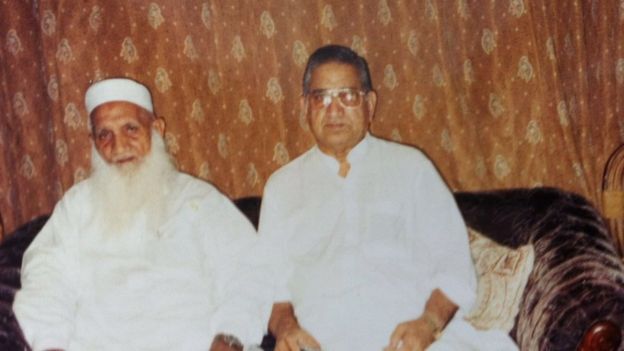 JAHAN MAHMOODMohammed Zabir (left) with his brother Ali Mahmood
JAHAN MAHMOODMohammed Zabir (left) with his brother Ali Mahmood"People said to me 'what have you ever done for this country?' and 'you should go back home'."
While he accepts there has been an increase in acknowledgement of the service of Muslims, he said better education would improve tolerance in Britain today.
"I still don't think there is enough information out there," he said. "British historians on the whole and the media just haven't highlighted this contribution.
"Historians of ethnic background and activists have had to bring this to the nation's attention.
"If more had been done, maybe we would not be in the predicament we are in today as there might be less racism and Islamophobia across society."
Mr Khatwala concurs.
"Highlighting the Muslim contribution dispels the far-right conception that Islam is a foreign or alien thing that can't be British."
Disclaimer:Everyone posting to this Forum bears the sole responsibility for any legal consequences of his or her postings, and hence statements and facts must be presented responsibly. Your continued membership signifies that you agree to this disclaimer and pledge to abide by our Rules and Guidelines.To unsubscribe from this group, send email to: ugandans-at-heart+unsubscribe@googlegroups.com








0 comments:
Post a Comment